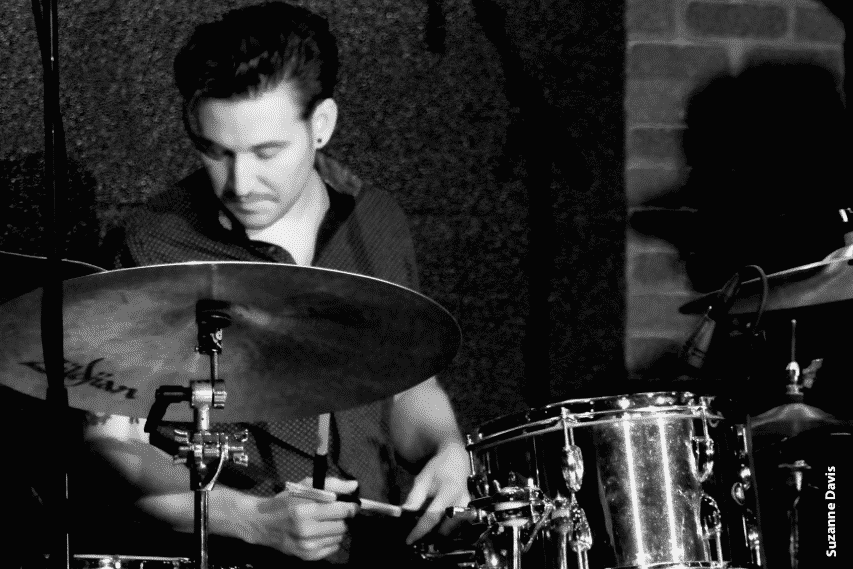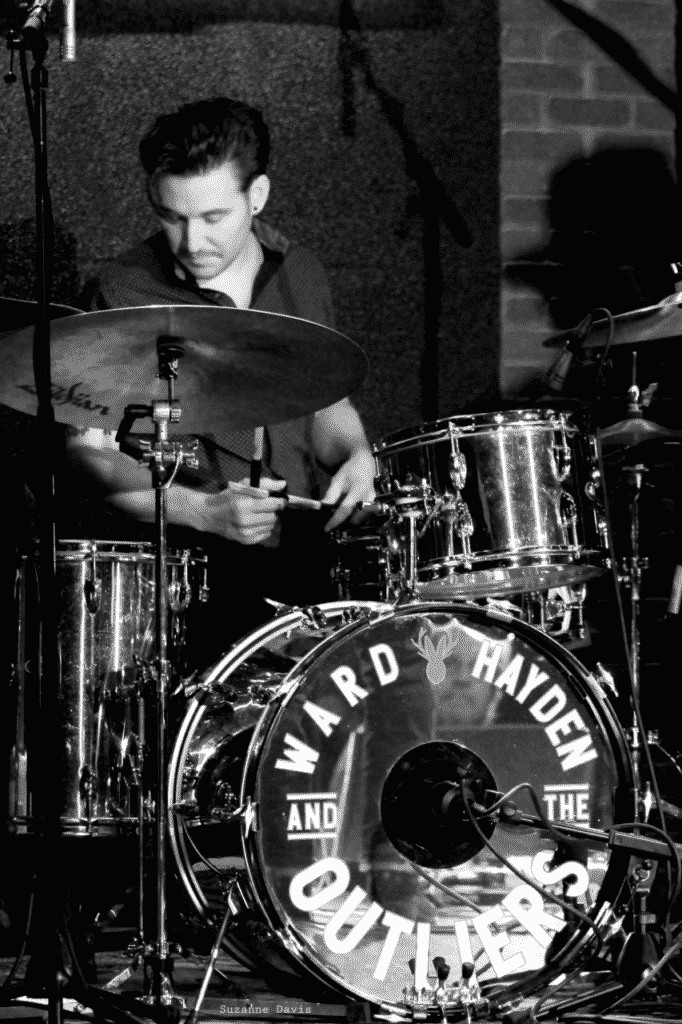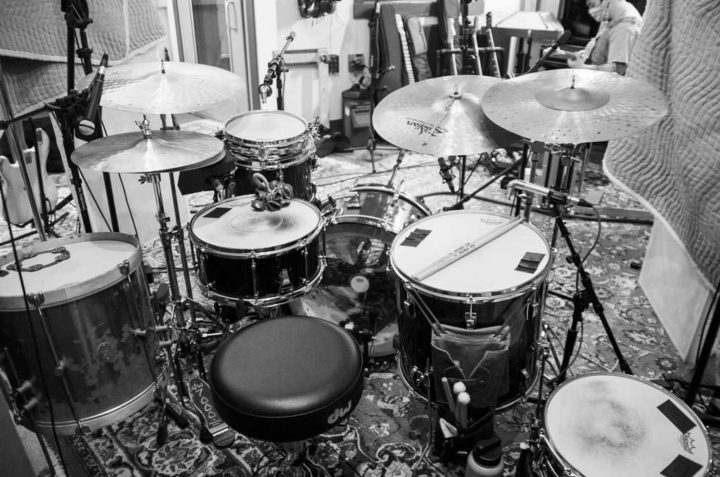Web Exclusive Feature: Josh Kiggans of Ward Hayden and the Outliers

Josh Kiggans of Ward Hayden and the Outliers on the recording of their new album “Free Country.”

Josh Kiggans of Ward Hayden and the Outliers:
My general approach is to always serve the song. I try to craft my parts in a way that will showcase the strength of a tune. Sometimes that means fast and loud and sometimes that means slow, low, or nothing at all. With social media there seems to be a lot of focus on over the top playing and a lot of notes but if you really dive into who’s working with a wide range of artists, whether live or in studio, you start to notice the common thread of “playing the song”. To me that’s the highest compliment you can get as a musician. In my playing and in crafting the parts for this record I really was striving to always put the song first.
“Nothing To Do (For Real This Time)” – The arrangement on this tune changed in the studio right before we tracked it. During the writing and demoing phase I had been riding on the floor tom taking an almost punk drumming approach to the song. Our producer, Eric ‘Roscoe’ Ambel, suggested I tighten it up a bit and chase a “Stones” vibe, less rock and heavier on the roll. I love Charlie Watts so channeling him was a blast. Charlie is one of my favorite drummers, he swings so hard and I really dig the jazz in his playing. I encourage everyone to transcribe the drum part from a Rolling Stones tune, it’ll blow your mind! Getting inside of Charlie’s playing opens up a lot of things; you start noticing that he’s really right hand heavy in fills and he doesn’t hit the floor tom that much. He plays parts but isn’t married to them, he’ll open the hi high in a-typical places or change the bass drum pattern on a whim. I tried to borrow from all this on “Nothing To Do”, it’s my attempt to honor one of the GOATs.
“When The Hammer Falls” – We went pretty out on this one. We put a lot of jangly percussion on the kit and tried to alter the “natural” sound of the drums and cymbals without relying too heavily on post-production techniques. Basically we wanted to get the super big and crunchy sound right off the jump. I have an old 6.5” mahogany snare that I detuned and we even used a big A&F floor SNOM so I could split up the “teen beat” part. I’m a huge fan of the drummers that were creating what would be called “rock n roll” and even though this song is big and bombastic it’s very much rhythmically rooted in the styles of Earl Palmer, Charles Connor, and Fred Below. Advertisement
“Middle Man” – I’m a huge fan of songwriters because I’m a fan of songs. My mission on each recording is to put the song first. I want to serve the song as best I can. On this particular track we were going for that dusty gunfighter western feel and I immediately thought of the late-great Paul English, drummer and right hand man for Willie Nelson. We put a big puffy beater on an old Radio King bass drum and I played a country shuffle on the snare with brushes. Nothing fancy but I feel like the song shines, letting the guitar line and lyrics do the heavy lifting. The only thing for me to do was stay out of the way and play a few fills to help each section round the corner. It’s one of my favorite songs on the record.
Heading into March of 2020 we had a few songs under our belt for a new record from a songwriting retreat we took up to a cabin in Maine. We limped off the road in mid-March and headed into what was to be a two week lockdown. Weeks turned to months and we were forced to reschedule our April studio dates, for the first time.
The weather warmed and we took to writing and rehearsing outside on Ward’s porch, deep on Boston’s legendary South Shore. During this time Ward began to write at a feverish pace. New songs appeared at every weekly rehearsal. In the past the majority of the songwriting and flushing out of a new album was done on the road. This album is the first time the band wrote without immediate feedback from a live audience. As the summer pushed into fall, and after another studio rescheduling, we realized that we needed to move our rehearsals indoors. Advertisement
Our manager quickly secured us a vacant and absolutely massive warehouse space in Fall River, MA to move into. We setup and continued to work and rework the songs we’d been rehearsing on the porch. The cavernous sound of the warehouse quickly began to inform our approach to writing. There was so much natural reverb in the room that we were forced to focus on only the most important parts of each song. Continuously trimming fat and carving out parts to highlight the lyrics.
Our producer, Eric “Roscoe” Amble, was very clear that he didn’t want polished demos, he wanted “boomboxrecordings”. So we sent him iPhone recordings from “the cave”, as he called it. Heading into the studio we picked 15 of what we felt were the best songs to choose from.
Each day at Mad Oak Studios, located in the Boston neighborhood of Allston, the engineer, Benny Grotto, would hit record and we’d warm up by playing three or four songs while Roscoe and Benny would dial in sounds. These warmups would serve as real time demos and references for the collection of 10 songs that would make up the album. Advertisement
After five days the bulk of the recording was completed and the mixes were roughed out, we all returned home. A handful of the songs still needed background vocals, additional guitars, and percussion added. With Roscoe in Brooklyn, Cody in Boston, and Josh in Connecticut, the songs were rounded out by bouncing tracks back and forth from home studios. With the bells and whistles added, Roscoe took the tracks to his studio Cowboy Technical Services in Brooklyn for final mixing. Using the program Audio Movers we were all able to listen in real time to the mix sessions from our homes giving questions, tweaks, and approvals via group text.
Soup to nuts, this record is truly a testament to the resilience and creative problem solving of this band through the entirety of the pandemic.
Thank you and shout out to my gear companies; Vic Firth, Zildjian, and SJC.

About the band:
Ward Hayden, guitar and vocals; Josh Kiggans, drums; Greg Hall, bass; and Cody Nilsen, lead guitar and pedal steel, returned home from the road in mid-March with a few new songs and April studio dates on the book. As the weeks went by, they started writing and rehearsing outside on Ward’s porch on Boston’s South Shore. Ward began to write feverishly and news songs were introduced at each weekly rehearsal. In the past the majority of the songwriting and flushing out of a new album was done on the road. This album is the first time the band wrote without immediate feedback from a live audience.
Free Country is an excellent example of the resilience, innovation and creativity that has come out of this pandemic but the depth of the individual and socio-cultural ruminations on this album will ensure that it will remain relevant once we as a country have moved on. Advertisement


